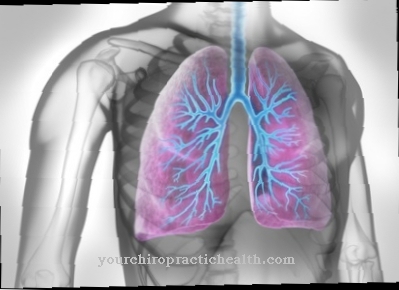A Facial swelling can occur for a variety of reasons. These reasons include, for example, allergies, headaches, kidney dysfunction, and diseases of the head and face. Facial swelling also occurs with some childhood diseases such as mumps and with diseases of the teeth and jaw.
What is facial swelling?

Facial swelling is the unnatural swelling of the face that is not due to weight gain. In kidney patients these are the typical, "doughy" edema under the eyes.
Many internal diseases, which can affect not only the kidneys, but also the liver and other organs, are accompanied by facial swelling. Alcohol abuse and substance abuse can also show up in facial swelling. With bad teeth and diseases in the jaw area as well as after dental interventions, facial swelling is very common, although this is usually one-sided.
Acute, allergic reactions can also lead to facial swelling. After all, nights spent, headaches, migraines, and trigeminal neuralgia are also responsible for facial swelling.
causes
Any other facial swelling that cannot be explained should always lead the person concerned to the doctor. This can sometimes make a suspected diagnosis based on the type of swelling and examine the patient in this direction.
He will do a blood count, check that the kidneys are working, and possibly send the patient to a dermatologist for an allergy test. Sometimes the swelling of the face under the eyes is the first sign of chronic or acute kidney failure, especially in people with kidney disease. If there is a life illness, facial swelling is also very common. Not only acute alcohol abuse can lead to such swelling, but also chronic liver failure and liver cancer.
Migraine attacks can cause a wide range of symptoms and it is not uncommon for such an attack to lead to facial swelling, usually one-sided. Trigeminal neuralgia is also a very painful affair, as this fifth cranial nerve is damaged or inflamed. Diseases in the tooth and jaw area lead to one-sided, sometimes considerable facial swelling.
You can find your medication here
➔ Medicines against swellingDiseases with this symptom
- allergy
- cold
- Inflammation of the kidneys
- mumps
- Root inflammation
- Kidney weakness
- Renal pelvic inflammation
- Kidney failure with urinary poisoning (uremia)
- Alcohol addiction
- Liver failure
- Drug addiction
- Trigeminal neuralgia
- migraine
- Acute kidney failure
- Liver cancer (liver cancer)
Diagnosis & course
While the facial swelling in dental and jaw diseases gradually disappears after the treatment, other patients may experience permanent facial swelling. This includes patients with diseases of the liver, kidney, thyroid, and heart.
Here, as with jaw disease, the causes need to be treated, but improvement is not in sight in all cases. Edema, i.e. water retention under the eyes, is particularly characteristic of kidney disease and is primarily chronic. Contact and food allergies as well as insect bites can also lead to facial swelling, which the doctor can detect during further examinations.
Unfortunately, physical violence occurs again and again in families. Doctors are advised to watch out for facial swelling, especially in children and women, that could be caused by beatings and other forms of abuse. Not every child and not every woman speaks about physical violence, which occurs in all social classes of society.
Complications
Puffiness on the face is not only bad because of its visible appearance. They can also lead to massive complications. Different complications are possible depending on the cause of the swelling.
If the cause is erysipelas (a wound rose), the first complication is the possibility that blistered detachments form the upper layer of the skin. Then the infection can spread in the area of the lymphatic clefts, which sometimes leads to swelling of the lymph nodes. Blisters or bleeding in the area of inflamed skin areas caused by streptococci as pathogens can occur especially when toxins (poisonous substances) are secreted. People with a disturbed immune system are particularly at risk of congestion because the lymph can no longer drain properly. Lymphedema (lymph swelling) cannot be ruled out. In the worst case, the lymph swellings are irreversibly permeated with connective tissue. Thrombophlebitis (inflammation of the veins) and, in rare cases, sepsis (blood poisoning) are also possible. The kidneys are also endangered by incorrect immunological reactions. If bacteria get into the brain, meningitis cannot be ruled out any more than cerebral vein thrombosis. Chronifications are also known.
In the case of shingles with swelling of the face, care must be taken that the ophthalmic zoster does not manifest itself in the form of an inflammation in the conjunctiva, sclera, iris or cornea. Paralysis of the eye muscle is also possible and, like all other complications, should be examined immediately by a specialist orphthalmologist. In the ear area, zoster oticus can lead to fascial paralysis. If the pain persists after approx. Four weeks, the stage is post-therapeutic neuralgia with or without sensory disturbances.
When should you go to the doctor?
Facial swelling can be an important body warning that it is imperative to listen to. It is imperative to clarify why the complaints arose. This is especially true for sudden and easily visible swellings that cannot be traced back to any specific cause. Because often there is also the suspicion of a previously unknown allergy.
Early medical advice is particularly helpful after the consumption of nuts or other foods, which are a frequent reference point for intolerance. This also applies if another allergic shock is suspected. If a food intolerance is known, the appropriate medication should be administered. It is imperative to consult a doctor afterwards.
But even if the facial swelling is in all probability not the result of an allergy or intolerance, it is essential to obtain professional medical treatment. The emergency doctor does not have to be consulted. However, waiting a long time is counterproductive. It could jeopardize the success of the treatment and intensify the existing causes.
Due to the large number of possible causes, particular care must be taken with facial swelling. In case of doubt, those affected should decide to visit a doctor in order to protect themselves and others from danger.
Doctors & therapists in your area
Treatment & Therapy
Facial swelling is treated according to the underlying cause. Cold pads after tooth extractions and other jaw treatments can bring relief and reduce swelling.
If there is an acute allergy, the doctor can treat it with antihistamines, which are either injected or given in tablet form. Headaches, migraines and trigeminal neuralgia very often turn into chronic forms with acute attacks. After the end of such pain attacks, facial swelling usually disappears very quickly. While affected patients could hardly be helped a few decades ago, modern painkillers and treatment preparations are available today.
Migraines in particular can be due to a variety of causes such as hormonal fluctuations, food intolerance and a family disposition. It takes time and patience to treat migraines, trigeminal neuralgia, and other forms of facial pain, headache and the associated facial swelling.
If the doctor recognizes that there is swelling of the face in children or adolescents such as the often cited "black eye", then he does not only have to carry out a precise full-body examination. He must document the injuries and immediately inform the responsible authorities so that protection and help can be offered to the minors concerned.
Outlook & forecast
If the facial swelling is due to an allergy, the symptoms can usually be treated very successfully with medication. Creams, ointments as well as eye and nose drops that contain antihistamines or cortisone are used to counteract allergic inflammation. The facial swelling will decrease promptly after using these drugs. However, the patient must expect the facial swelling to reappear each time they come into contact with the allergen.
In the case of contact allergies and food intolerances, it is necessary to adapt your lifestyle and consumption habits. It becomes more difficult for patients who suffer from hay fever or are allergic to house dust, since in these cases it is hardly possible to consistently avoid the irritants. These patients have to be prepared for a chronic illness and the constant recurrence of certain symptoms. In severe cases, desensitization (vaccination cure) can also be considered, but this is protracted and not suitable for all those affected.
A visit to the dentist usually provides immediate relief for facial swelling caused by problems with your teeth or jaw. Occasionally, facial swelling occurs while the so-called wisdom teeth are growing. As a rule, the dentist cannot provide therapeutic support here. However, the swelling is harmless and will go away on its own after a few days.
If the facial swelling is due to an underlying illness such as a cold or a childhood illness, then the symptoms usually subside in parallel with the causal illness.
You can find your medication here
➔ Medicines against swellingprevention
Facial swelling can often be avoided through a healthy lifestyle. Allergy sufferers are treated by dermatologists and allergists with desensitization and the triggering allergen must be avoided.
Regular visits to the dentist help to avoid tooth decay and inflammation of the gums and thus also facial swelling. Patients with migraines, trigeminal neuralgia and other forms of headache can receive long-term treatment for their underlying disease.
In diseases of the internal organs, the focus is on treating the underlying disease so that chronic facial swelling does not occur. Children and women need help with abuse and the resulting facial swelling.
You can do that yourself
Swelling on the face is not only painful, but can also be felt as a heavy burden in everyday life. Depending on what triggered the facial swelling, there are options that can be taken alongside medical therapy to alleviate the suffering.
Cold helps against swelling. Cooling pads from the pharmacy can be wrapped in a tea towel and held on the affected area. Alternatively, ice cubes can also be used for this. It is important not to press too hard. Such a cold treatment should not last longer than ten minutes at a time. However, it can be done up to five times a day. An old home remedy for facial swelling is to use a turmeric and sandalwood paste. This can easily be made by yourself. Simply mix red sandalwood with the same amount of turmeric to form a homogeneous mixture. The mixture can then be applied to the affected areas of the skin. This paste has a calming and decongestant effect and can be washed off with water after half an hour.
Puffiness in the face can also be triggered by incorrect eating habits. Often, too much sodium consumption is the cause. Excessive sodium consumption in the form of table salt can lead to an accumulation of fluid in the skin tissue. Accordingly, it can be helpful to reduce your salt consumption. The accumulation of fluid under the skin of the face can still be relieved by using an additional pillow. If the head is higher when sleeping, the fluid can drain better.













.jpg)

.jpg)
.jpg)











.jpg)